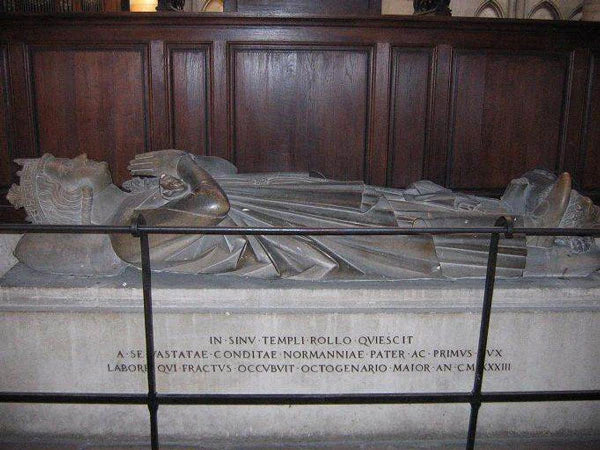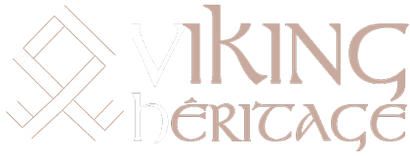🎁 Enjoy 10% off with code VIKING10
🎁 Enjoy 10% off with code VIKING10
Rollo
March 20, 2023 7 min read

Rollo or Rollon of Normandy | The Christian Viking King !
The Viking civilization shaped the western world through its almost invincible Viking warriors. Many legendary Viking heroes have made this people the most valiant in Europe. One of these mythical names is none other than the Viking leader Rollo.
Rollo, or Rollon, is a mythical Norse Viking who marched and conquered much of Europe. After many conquests, he finally settled permanently in the western lands of Francia. First, a renowned Viking warrior, then a Christian king of Europe: this historical figure has always been an emblematic Scandinavian figure.
In this article, we are going to tell you the story of Rollo or King Rollon. You will follow the progression of this unique character, starting from his origins as a great Viking warrior, to the moment he becomes the Duke of Normandy.
The story of Rollo: the origins of Rollo the Viking!

Rollo was born around 860 AD in Scandinavia. He was one of the greatest Viking leaders of his time. He feared nothing and no one on the battlefield, and this is part of what allowed him to conquer many parts of Europe.
Rollon gained great popularity when he made an agreement with the Frankish king Charles the Simple. This pact allowed him to found his own kingdom in the west of France, Normandy. During this agreement, he converted to Christianity, renouncing his pagan religion, to be baptized under the name of Robert. He will rule this region from 911, until his death around 930 AD.
From this moment, the history of Rollo takes a radical turn. He goes from a barbaric and savage Viking chief, to the model of the king with great Christian virtues who restores law and order throughout Europe.
This second part of Rollo's life was largely embellished by Christian historians and writers of that time. He became for many a religious symbol. This is one of the reasons why the majority of the accounts of this period ignore Rollo's Viking past.
In this article we will tell you about Rollo's rise from a simple Viking warrior to the title of king and ancestor of great kings of Europe, including the famous William the Conqueror!
The origin of the name Rollo and its evolution

Rollon has had many names over the years. Indeed, because of his many travels and the various cultures he encountered, his first name evolved from :
- Hrólfr, which is his Viking name in Old Norse. According to the French historian Adigard des Gautries, "Hrólfr" is a combination of "hróð" which means "glory and victory", and "ulfr" which means "wolf" in Old Norse. Hrólfr would thus mean "the glorious wolf";
- The other, less popular, origin of his name would be the Germanic form "Rolf";
- Rollo corresponds to the Latinized version, very popular, of "Hrólfr";
- Rollon, on the other hand, is the French pronunciation derived from the Latin version;
- In some Norman works, Rollo is simply called "Rou". This pronunciation is the version of Hrólfr adopted in the Norman dialect;
- After his baptism, Rollo took the name of Robert I, and in other works that of Robert le Riche.
According to the Landnámabók, Rollo had a nickname. He was called Göngu-Hrólfr, which means "Rollo or Rolf the Walker". This is explained by the fact that, with his imposing size, no mount could carry him more than 50 meters. Indeed, according to the same legends, Rollo had a very imposing build, with more than 6,56 feet high and 300lbs. He was even sometimes compared to a giant.
The origins of Rollon
As with many of the characters in Viking mythology, the story of Rollo includes many semi-legendary accounts. This was customary at the time, as most historians wanted to reinforce the legitimacy of certain royal lines. According to the historian Robert Ferguson, this practice often aims to mystify ordinary men, and to make them mythical and divine beings.
Thus, the exact origin of Rollo is unknown. However, many historians have told his legend:
- According to Dudo de Saint-Quentin, a Norman historian of the tenth century, Rollo was originally from Denmark, from a family of aristocrats. To reinforce this version, Dudo claims that Rollo is a close friend of a Norse Viking chief "Guthrum";
- According to the writings of William of Malmesbury, a work written between the eleventh and twelfth centuries, the same noble origin would be attributed to him. However, in this account, Rollo would come from an aristocratic family, but this time from Norway.
- Later, the Icelandic historian "Snorri Sturlson" supports this version.
The majority of Vikings being of Danish origin, it is the version of Dudo which is the most plausible. Especially since one of Rollo's grandsons, Archbishop Robert II of Rouen, was nicknamed Robert the Dane. Even if the origin of Rollo remains uncertain to this day, it is thus a source of Denmark which is more reasonable.
The exploits of Rollo the Viking chief
Rollo is not the brother of Ragnar Lothbork, despite what the Vikings series suggests. Indeed, Ragnar was born towards the end of the 8th century, around the year 790, and he died in the year 865 in a dungeon in Northumbria. Whereas Rollo was born after the year 860.
Rollo's meeting with Ragnar is therefore unlikely, but this is not the case for his sons. Indeed, Rollo would have led and played a major role in the raids and expeditions of Europe alongside Ragnar's sons, Ivar the Boneless and Björn I.
Rollo's power and authority were not in doubt within the Viking army. The chronicler Flodoard supports Dudo's account, describing Rollo as an outstanding Viking leader.
Because of the wealth of West Francia, the greatest Vikings led attacks to plunder it:
- Around 858 AD, Bjorn of the Iron Coast led his first attack on this region, shortly before his expedition to the Mediterranean. He was supported in this attack by Rollo;
- In 876 AD, Rollo led more than 100 ships up the Seine to raid this region. In other accounts, he would have co-led the attack or at least was a decisive pawn in its development;
- Finally, between the year 885-886, Rollo would have participated and played a principal role in the siege of Paris.
After all these attacks, the only solution left to West Francia was to pay the Vikings to leave their cities. However, this did not stop the Viking leaders from coming back and imposing various taxes on them again.
The agreement of Rollo with Charles the Simple

Charles the Simple, king of the Franks and West Francia, understood that paying the Vikings was not a solution to put an end to their raids once and for all. According to Dudo, it was the king's advisors who came up with the ingenious idea of allying with Rollon, the most powerful of the Viking chiefs, by offering him :
- A domain and lands of the most coveted in northwestern Francia ;
- In addition to joining the hand of the daughter of King Charles, Gisla, in marriage to this Viking king.
King Charles' offer was very generous. Only, if Rollo had accepted this agreement, he would have reigned a lasting peace over the whole region of West Francia. The only condition of the king was that Rollo had to be baptized and thus renounce his pagan Nordic religion for Christ.
Rollon, after consulting his Danish Viking chiefs, accepted the agreement, but refused to be baptized. He reproaches the king for offering him infertile and ruined lands. Forced to accept Rollo's demands, King Charles offered him the land of Brittany. Thus, in the year 911 AD, Rollo was baptized, married Gislala, daughter of the king, and became Robert I.
Rollo of Normandy: was he the first Viking duke?

Rollo kept all his promises and worked for a lasting peace between his people and the Franks. There were no Viking raids after 911 AD on Francia. In addition to this, Rollo proved to be a great ally, as he worked on :
- The improvement of all the lands that were offered to him, in every respect;
- The reconstruction of the churches and temples that were destroyed during the Viking raids;
- Not to mention the improvement of the city's defenses, by erecting walls and forts.
All this has earned Rollo, or Robert I, the praise of all Norman historians. Although many historians gave him the title of duke and creator of the Norman duchy, he was in reality only a jarl or count of Normandy. The name of Normandy comes from "Northmen" which means the land of the Vikings, an additional tribute to this key character.
Rollon, the Viking jarl of peace
Rollo rules his duchy like a true Viking chieftain, and works very hard to establish peace and security for its inhabitants. He enforces harsh laws on thieves, killers and even for lesser offenses such as a man dishonoring his neighbor.
Sometimes described as too strict, Rollo's policy proved to be successful, and lasting security was established throughout Normandy. According to some legends, to show the absence of thieves in his duchy :
- He hangs a gold ring on a tree that has not been touched for more than 3 years;
- In the township of Heuland, he hangs gold jewels on the Rollon cross that nobody has ever dared to approach.
The prosperity that reigned over this region for more than a century was largely due to the efforts of Rollo.
Other accounts and legends claim that Rollo broke his oath with King Charles. More than ten years after this agreement, these sources tell of Rollo embarking on new raiding and pillaging expeditions. These accounts remain highly contested and controversial among modern historians.
The mysterious death of Rollo

To this day, there is still some doubt about the circumstances of Rollon's death. The versions differ from one author to another, without providing clear answers on this subject, or even specifying the exact date of his death.
Three hypotheses are retained in modern history. Each one is associated with different facts.
The first one is related by Richer de Reims. According to him, it would be during a siege on the castle of Eu, around the year 927, that Rollon lost his life. This theory is based on the fact that his son, William the Long Sword, took an oath of loyalty to the Normans two years after this incident.
However, some do not agree with this theory. Some historians say that the Viking king complied with the wishes of his son, and that he had surrendered to the Normans during his lifetime.
The second version postpones his death to the year 933. The author of this version, Adémar de Chabannes, states that King Rollo made many sacrifices, both Christian and Viking, before his last breath.
The latest story about Rollo's death says that he lived out his days just before the middle of the 10th century. Its author, Father Anselm, states that the ceremony took place in the cathedral of Rouen so dear to him.
In any case, King Rollon, half-pagan, half-Christian, has marked the history of the Vikings. His reign over Brittany and his numerous exploits make him a memorable historical figure. Viking leader and Norman duke, his time is known to be the peak of the mixing of the Viking people with the rest of the European civilization.
Leave a comment
Comments will be approved before showing up.




